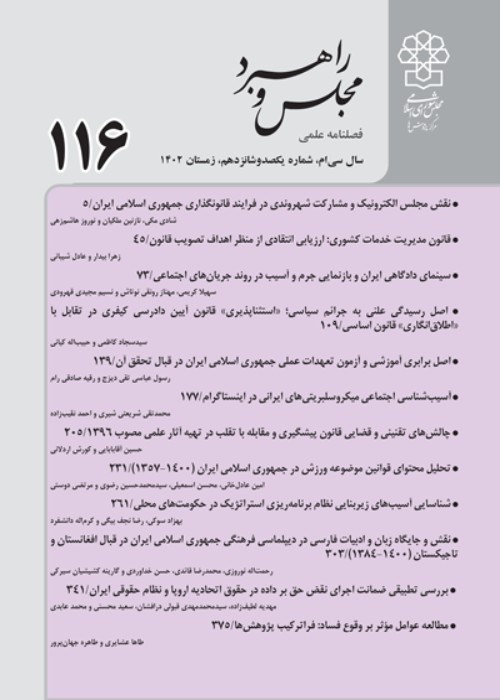Develop an Appropriate Model for the Role of Pressure Groups in the linear Formation of Iran's General Policy
Author(s):
Article Type:
Research/Original Article (دارای رتبه معتبر)
Abstract:
Politics involves decision-making, and decisions are the result of group conflict. Political decisions are nothing but the result of the interaction of pressure groups and the relationship of power between them. Pressure groups try to present their demands to the political system and public policy. To. A pressure group is a group of people who have political goals and want to influence the law, and a stakeholder group is a group of people who have common interests and do not have political goals. Pressure groups can be examined from two perspectives. The classical view that the performance of pressure groups disrupts the political system and public policy; and the modern view that not only does not reject the performance of pressure groups, but also considers the existence of these groups as a dynamic aspect of the organization and a tool to improve public participation. brings. One of the biggest areas of action for pressure groups is the legislature and parliaments. The role of pressure groups in shaping public policy with the foundation data theory approach is through the three stages of open, central and selective coding. The statistical participants are the current and periodic members of parliament in the country. Using purposive sampling method, semi-structured interviews were conducted with 22 members of parliament in an 18-month period until the data saturation stage was reached. Members were validated by matching methods. The present research is a mixed type, so data analysis consists of two phases, qualitative and quantitative. In the qualitative phase, to analyze and interpret (codify) the concepts expressed by members of parliament and experts. Iran is covered, which includes open, axial and selective coding. In addition, Delphi method has been used for localization and screening of indicators. Data analysis has been used using MaxQDA2012, Excel2016 and SPSS software. Open, axial and selective coding was used to analyze the data. During the data comparison process in the open, axial and selective coding path, 132 concepts, 71 subcategories and 24 general categories were obtained and presented in the form of a paradigm model. The integration of categories, based on the existing relationships between them, around the involvement of groups in professional activities, formed a paradigm model that reflected the development of an appropriate model of the role of pressure groups in shaping public policy. Causal conditions (influence of pressure groups on decisions, indirect influence on public opinion, party orientation, incorrect structure of democracy, lack of holistic view, etc.), central category (gaining benefits and advantages, adaptation of pressure groups to policy needs General (intervention) conditions (use of coercive tools of influence, behind-the-scenes issues and interference of officials in each other) strategies (dissemination of information, use of powerful people, transparency and defeat of monopolies) and consequences (promise, policy-making citizen and unity and integrity) emerged and Relationships between different dimensions were shown through the formation of a conceptual model. Finally, legal propositions and strategic hypotheses of the research were developed.
Keywords:
Language:
Persian
Published:
Majlis and Rahbord, Volume:28 Issue: 107, 2021
Pages:
241 to 270
magiran.com/p2328130
دانلود و مطالعه متن این مقاله با یکی از روشهای زیر امکان پذیر است:
اشتراک شخصی
با عضویت و پرداخت آنلاین حق اشتراک یکساله به مبلغ 1,390,000ريال میتوانید 70 عنوان مطلب دانلود کنید!
اشتراک سازمانی
به کتابخانه دانشگاه یا محل کار خود پیشنهاد کنید تا اشتراک سازمانی این پایگاه را برای دسترسی نامحدود همه کاربران به متن مطالب تهیه نمایند!
توجه!
- حق عضویت دریافتی صرف حمایت از نشریات عضو و نگهداری، تکمیل و توسعه مگیران میشود.
- پرداخت حق اشتراک و دانلود مقالات اجازه بازنشر آن در سایر رسانههای چاپی و دیجیتال را به کاربر نمیدهد.
In order to view content subscription is required
Personal subscription
Subscribe magiran.com for 70 € euros via PayPal and download 70 articles during a year.
Organization subscription
Please contact us to subscribe your university or library for unlimited access!





